This year, the Best Human Rights Books list is being published every four months. The rights issues addressed in these titles include those of indigenous peoples; humanitarian rights and war crimes; crimes against humanity; enforced disappearances and extrajudicial killings; arbitrary detention; legal rights; prisoners’ rights; torture and cruel, inhuman or degrading treatment; the death penalty; mass surveillance and the right to privacy; censorship, freedom of expression, propaganda, and the rights to information and freedom of belief; social movements for rights; and gun violence.
The places involved include China, El Salvador, Northern Ireland, Syria, Turkey, United States and others. There are ten books from the first four months of 2019 and four from 2018, as well as 20 other notable books I didn’t get a chance to read. In all, more than 50 books have been considered. If you follow the links below and purchase the books, five per cent of your order goes to Hong Kong Free Press, high-quality, fully independent, not-for-profit journalism in a time and place where freedom of expression is under threat.
The Heartbeat of Wounded Knee: Native America from 1890 to the Present, David Treuer (Riverhead Books)

This book is intended as a counter-narrative to the stories about Native Americans that are perhaps most prevalent in the media, and feature exceedingly high rates of poverty, violence, substance abuse, incarceration and suicide.
Here, the history of Native Americans over the last 120 years is presented as something of a success story: if nothing else, they’ve survived, they’re still alive, and depending on where you look, getting stronger than ever.
That in itself is an accomplishment indeed, especially in the context of the other narrative The Heartbeat of Wounded Knee is writing against. That’s the story encapsulated in the book it echoes, Bury My Heart at Wounded Knee, which is probably the most popular and best known history of Native Americans of all time.
It tells the very true story of their decimation over centuries, the loss of their lives, land and culture, culminating in the Wounded Knee massacre of 1890. If that story was all one knew, one might be surprised that Native Americans even exist any more.
But exist they do. The sub-title of The Heartbeat of Wounded Knee is somewhat misleading in that it gives the impression of a straight-up history. History it is, but not only that. One aspect of the book that makes it an engaging read is that it toggles back and forth between history and the present, telling stories of how Native Americans lead and make sense of their lives today.
The book takes the reader through the key episodes and developments of the past century, portraying the progress made by Native Americans as a combination of their own struggle and the increasingly enlightened policies of the U.S. government.
I’ve spent time in Native communities in Minneapolis and both Dakotas and considered myself pretty well-informed, but I’d have to think hard to remember when I last learned so much from a single book.
Death is Hard Work, Khaled Khalifa, translated from the Arabic by Leri Price (Farrar, Straus and Giroux)
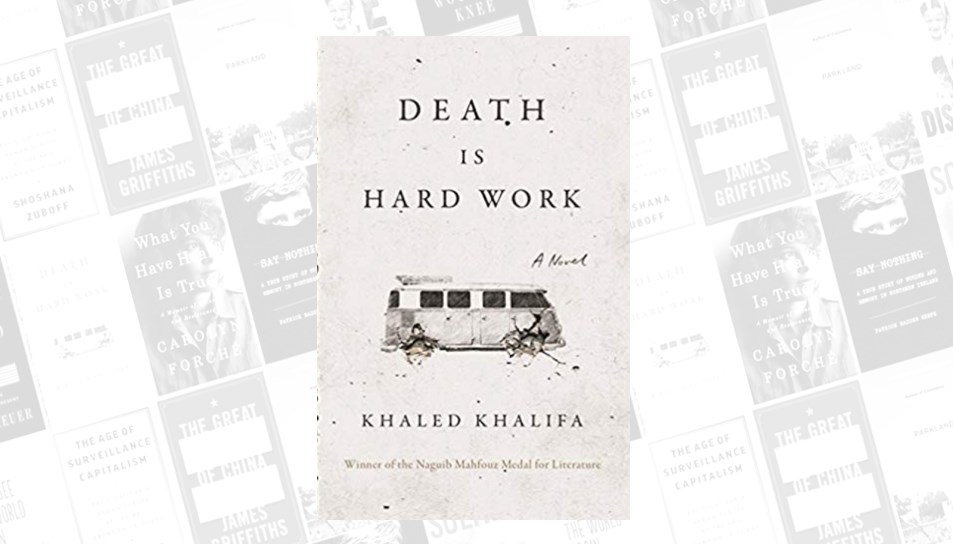
I’ve read many nonfiction books on Syria over the past half decade. This is the first novel, and, what may be more surprising given Syria’s horrific recent history, and the fact that hundreds of thousands have fled the country, it’s written by a novelist still living in Damascus.
The structure of the narrative may be vaguely inspired by Faulkner’s As I Lay Dying. A man dies in Damascus. His last wish is to be buried in his hometown.
Under normal circumstances, this would not be too hard. But because of the war, the journey entails crossing multiple checkpoints manned by various factions, first leaving government-controlled territory, then entering rebel territory, as well as avoiding other war-associated dangers.
As if that wasn’t challenging enough, it is the deceased man’s three children, estranged from one another, who very begrudgingly undertake to comply with his wish. While the father was a committed revolutionary, the children are just trying to survive.
The novel is the story of their trip. Besides Faulkner, Kafka is the other writer who comes to mind, since the story essentially involved placing the three in impossible situations and then seeing how they manage to extract themselves.
There is something of Kafka’s dark humour too, as implied in the title. And yes, the novel is soaked in death; the death of the father is only the start.
What You Have Heard is True: A Memoir of Witness and Resistance, Carolyn Forché (Penguin Press)
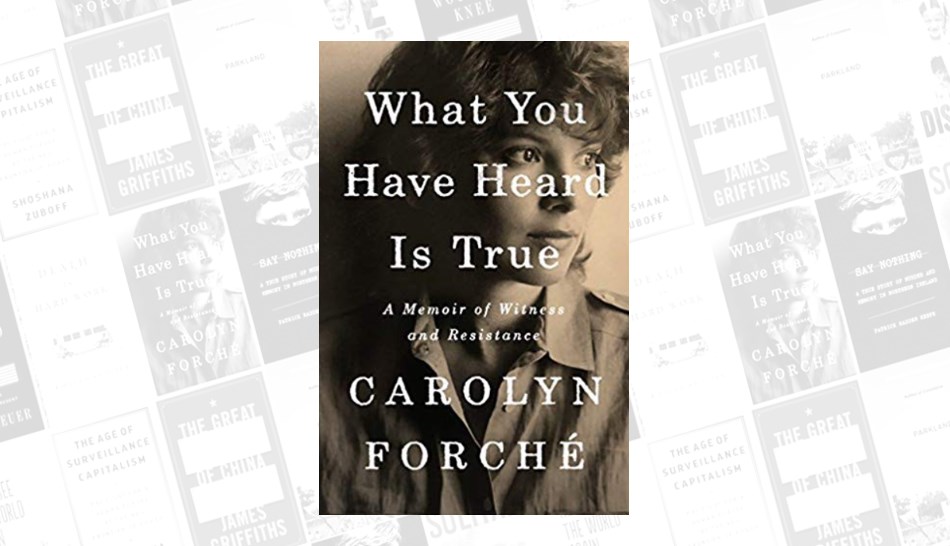
Forché is a well-known poet. This is a story from several decades ago. In the 1970s, a man she has never met before shows up on her doorstep in California. He wants to take her to El Salvador, a country on the brink of civil war, in order, essentially, to teach her.
Why? From her point of view, his intention isn’t clear except that he thinks it’s better to work with a poet than a journalist. She ends up making several trips to El Salvador, guided by this mysterious man.
At first, she isn’t even sure which “side” he’s on, and she constantly contends with situations in which she is well aware of her own ignorance. The country is in the grip of a right-wing military dictatorship which carries out atrocities while receiving copious aid from the U.S. government.
At the heart of the memoir is the depiction of Leonel, the mysterious Salvadoran, and the poet’s (platonic) relationship with him. It leads Forché to a lifelong commitment to human rights and to telling Americans about El Salvador’s plight.
Hers is a story about political awakening and about the discrepancy between the lives of those who live in places where rights are abused as a matter of course and those in places of relative comfort and security, a story about the need for the latter’s solidarity with the former. A good review
Say Nothing: A True Story of Murder and Memory in Northern Island, Patrick Radden Keefe (Doubleday)

The initial focal point of the book is the infamous murder of Jean McConville, a single mother of ten children who was disappeared from her home in Belfast, Northern Ireland in 1972 at the height of The Troubles, accused by the IRA of being an informant for the British.
While she was presumed dead, for decades no one really knew what happened to her. The book vividly evokes the oppressive atmosphere of Belfast at the time of the The Troubles, but at least half of it is about the decades-long aftermath, and in particular about trying to get to the bottom of the many IRA killings.
Central to that effort are taped interviews with key IRA figures that have been deposited at Boston College in the US, supposedly governed by an agreement with the interviewees that the tapes will remain inaccessible for decades to come. But what to do if they contain evidence of crimes?
The book’s counterpoint to IRA victim McConville is Dolours Price, a passionate IRA volunteer who later became disillusioned with the group and died recently, in 2013. Some of the stories in the book have been told before, but Radden Keefe weaves them together brilliantly.
One may ask why he concentrates almost solely on IRA killings when Unionists and the British army and police also killed. This is partly because he wants to tell the story of the secret tapes but also perhaps because of the romantic aura the Irish freedom struggle still possesses in many places, including the US.
As someone who’s been a big supporter of that freedom struggle but is also a resolute advocate of nonviolence, I don’t find the focus misplaced. If anything, the theme of the book is how the violence of political struggles has a long afterlife and threatens to entangle a society long into the future if it’s not confronted with some modicum of truth and justice.
As recently as March, Northern Ireland announced that only one British soldier would be charged for the Bloody Sunday killings of 1972, much to the chagrin of the victims’ families. Between 150 and 200 British soldiers are still under investigation for Troubles crimes. The violent past casts a long shadow, even in places that are relatively willing to look it squarely in the face.
Solitary: Unbroken by four decades in solitary confinement. My story of transformation and hope, Albert Woodfox (Grove Press)

Albert Woodfox served more than 40 years in solitary confinement at the Lousiana State Penitentiary, otherwise known as Angola, one of the most infamous prisons in the US. What’s more, he did so because of a murder he didn’t commit, that of a prison guard.
If you’re sceptical of his plea of innocence, it can certainly be said that his trial was far from fair and the treatment meted out to him was nothing short of cruel and abusive.
What is perhaps most striking about his memoir is the emphasis he places on his “conversion” in prison from ordinary petty criminal to Black Panther. The insight, political awareness and ethics that the Panthers gave him not only helped him to survive his brutal treatment but also made him into a compassionate person who helped fellow prisoners.
While the treatment of Woodfox is in some respects unusually extreme, the abuse of solitary confinement and a whole range of other abuses of prisoners are all too common in prisons in the US, as is racism in policing and mass incarceration. A good review.
I Will Never See the World Again, Ahmet Altan, translated from the Turkish by Yasemin Congar (Granta Books)
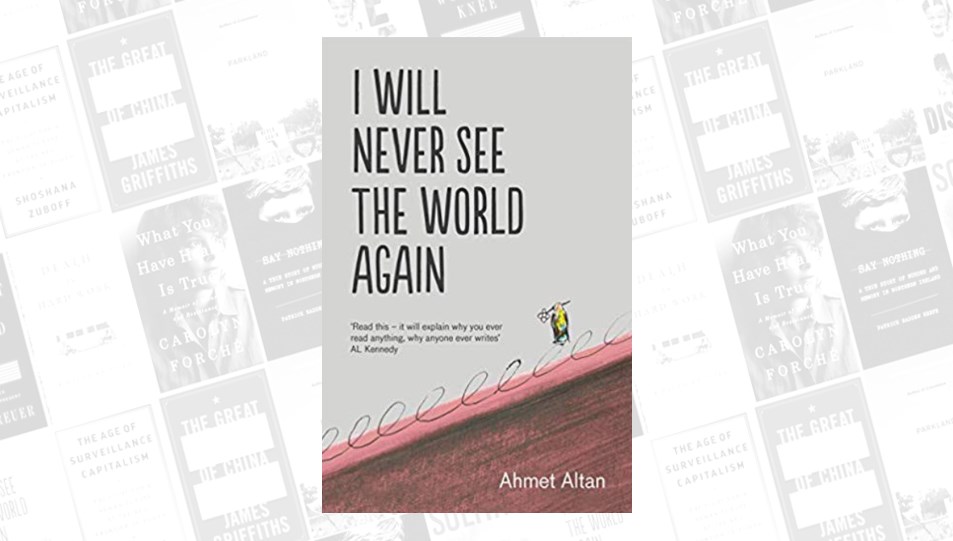
Altan is a well-known Turkish writer, both a novelist and journalist. In September 2016, he was arrested for supposedly using a television interview to send “subliminal messages” to plotters of a July 2016 coup that sought to topple the Turkish government.
As absurd as the charges sound, in February 2018, he was sentenced, along with his brother, to life in prison, where this book was written, smuggled out in notes Altan gave to his lawyer.
Ironically, his father, also a journalist, was imprisoned a half century before, giving a sense of how little Turkey has changed in some respects. When Altan is arrested, he utters the same words to the police that his father did.
On the way to prison, he cracks a joke, and this acts as a kind of epiphany that gives him the courage to go on. He believes in the power of writing, of the imagination to transcend circumstances even as dire as his, but prison is tough, and much of the rest of the book shows him struggling with the gross injustice that has befallen him.
Unfortunately, his case is not exceptional: 30,957 people are currently in prison in Turkey on “terror” and coup-related charges. I hope we may yet see him free again before long. An excerpt and a good review.
The Age of Surveillance Capitalism: The Fight for a Human Future at the New Frontier of Power, Shoshana Zuboff (PublicAffairs)

At over 700 pages long, this is Zuboff’s magnum opus. It comes in the latter part of a decades-long academic career as a sociologist. Indeed, the historical perspective she brings to her topic is one of the book’s great strengths.
A friend, a highly accomplished human rights researcher, says it’s been a long time since she last read a book this intellectually stimulating; she actually compared it to Hannah Arendt’s Origins of Totalitarianism.
I can see the point, for, in a sense, Zuboff is updating that iconic text, defining the new epoch of surveillance capitalism we live in now and describing just how different it is from the past.
Her definition of surveillance capitalism, which starts the book, is in itself brilliant and sums up the book’s argument better than I can:
- A new economic order that claims human experience as free raw material for hidden commercial practices of extraction, prediction, and sales;
- A parasitic economic logic in which the production of goods and services is subordinated to a new global architecture of behavioural modification;
- A rogue mutation of capitalism marked by concentrations of wealth, knowledge, and power unprecedented in human history;
- The foundational framework of a surveillance economy;
- As significant a threat to human nature in the twenty-first century as industrial capitalism was to the natural world in the nineteenth and twentieth;
- The origin of a new power that asserts dominance over society and presents startling challenges to market democracy;
- A movement that aims to impose a new collective order based on total certainty;
- An expropriation of critical human rights that is best understood as a coup from above: an overthrow of the people’s sovereignty.”
That last bit gets at the brunt of what this has to do with human rights. One question I have is why Zuboff focuses solely on private companies, and largely on Facebook and Google, the surveillance capitalists par excellence.
Is state surveillance substantially different? Is it more or less of a threat to democracy and human rights? If anything, a weakness of the book may be that it doesn’t entertain the prospect of China’s model of digital surveillance multiplying until it becomes the global norm.
Zuboff’s account is highly dystopian in the classic sense: She is outlining this new world that is coming into being; it is too soon to see what exactly it may lead to. Her emphasis on the fact that surveillance capitalists are not only monitoring you but also engaging in behavioural modification, essentially creating a new you, is especially chilling.
Probably the book’s biggest contribution is to provide the conceptual framework that allows us to see this and analyse it. It asserts that a new vocabulary is needed to describe this new reality, as well as new rights to defend human dignity.
Those mentioned include not only the expected rights to privacy and information as well as the right to be forgotten, now made famous by the new EU privacy regulations, but also the right to sanctuary and the right to a future tense.
It seems that in one sense, a possible solution is not that difficult, and it’s what has already started to occur in places like the European Union and California: regulation and democratic oversight. The challenge is political, not technical. In the light of the great power of corporations in general and tech companies in particular, are democratic societies up to it?
The Great Firewall of China: How to Build and Control an Alternative Version of the Internet, James Griffiths (Zed Books)
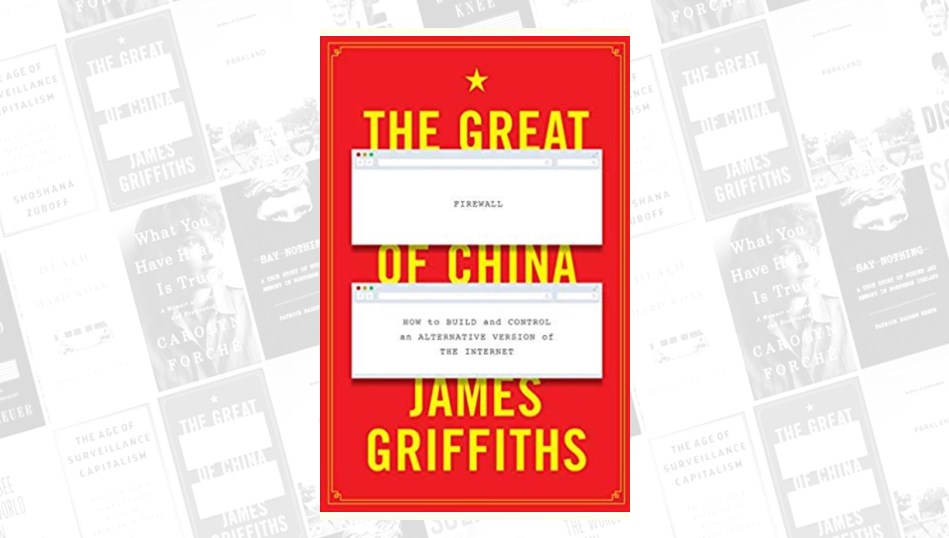
The Great Firewall is a comprehensive primer on the Chinese internet, which is its own digital ecosystem.
The book is divided into four parts — wall, shield, sword, war — and tells the story of how the Chinese government closed the Chinese internet off from the rest of the world, subdued and controlled the domestic internet so that it could not be used in ways that the regime perceived as threatening.
More recently the government has been trying to universalise its concept of a “controlled internet” and export it along with related technology to the rest of the world, in order to allow other authoritarian states to realise its vision.
Scary? Yes. Orwellian? Yes, and beyond. That is the reality we face today. Griffiths tells this story by reporting on a wide variety of key events and developments over the past three decades. He does the valuable service of providing a historic overview in a forgetful age about a place where oblivion is enforced. The book is well-written, highly readable, and analytically incisive.
Here’s an example: “China’s censors do not care about blocking content; they care about blocking solidarity. The number one target of censorship is not the Tiananmen Square massacre, or the banned religious movement Falun Gong, or news about official corruption, it is organisation outside the Party structure.
“Solidarity — such as that expressed by the hundreds of thousands of protesters in Beijing and other Chinese cities in 1989, or by the millions who took part in the Arab Spring — is the biggest threat to an authoritarian regime. China’s leaders, as members of a Leninist and supposedly Marxist movement (even if, in practice, they act like ruthless capitalists), know this better than most.”
An excerpt on “the Great Cannon”, attacks on targets abroad by hackers working for the Chinese state; and another excerpt on how China managed to rein in domestic internet discourse at a moment when it promised to become a tool to hold the government accountable.
Parkland: Birth of a Movement, Dave Cullen (Harper)

As the sub-title suggests, this is the story of how the students of Marjorie Stoneman Douglas High School of Parkland, Florida who survived the mass shooting there reacted to that tragedy by starting a movement to fight the U.S. gun violence epidemic. Cullen had fly-on-the-wall access to the nucleus of the student group and shows just how their movement developed.
The book is a fascinating study of what works and what doesn’t in social movements. What is striking about March for Our Lives, the eventual name of the movement is just how quickly it all developed and how powerful it has been.
One of the decisions of the movement that I find especially savvy and promising is that the MSD students connected with young people in urban areas with high levels of gun violence and insisted on joining with them in a common fight for sensible gun violence prevention policies.
In so doing, they are insisting that mass shootings and urban gun violence are all the same issue. Their proposals are moderate — essentially effective gun control — , and they go out of their way to say they don’t want to take away America’s beloved guns. Even so, they’ve met massive blowback.
Cullen portrays these activists in all their teenagery brilliance and silliness and the mayhem of their lives. His book reminds of Laura Wides-Muñoz’s The Making of a Dream about the DREAMers Movement, another in which young people made up the nucleus, as well as the more recent global student strikes for climate action.
Whenever I see young people taking effective action like this, I become more optimistic about the future.
We Are Displaced: My Journey and Stories from Refugee Girls Around the World, Malala Yousafzai (Little Brown)
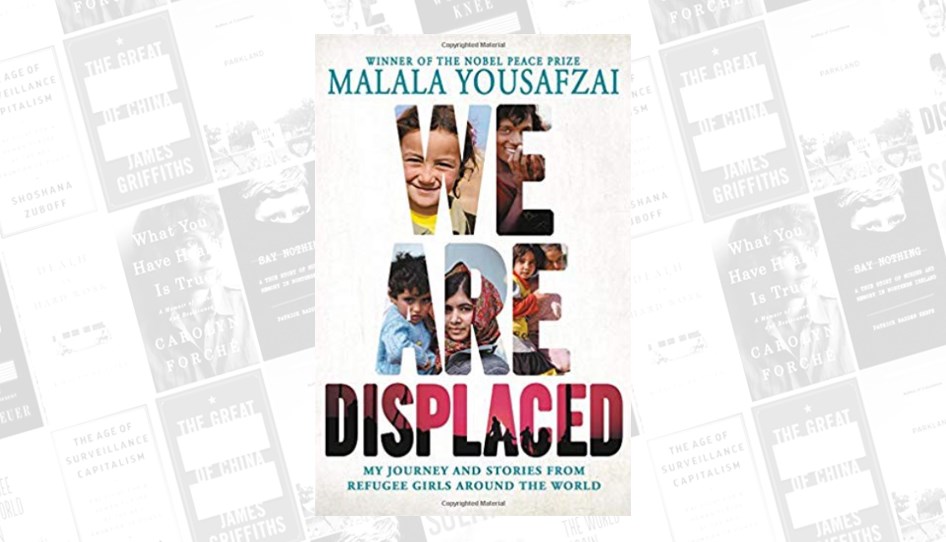
This book is pitched to young adults, apparently as part of the strategy of the Malala Fund to appeal to young people for solidarity with refugees, thereby building a support base that will endure far into the future.
Malala tells her own story as an internally displaced person, and this is followed by the stories of many refugee girls she has met in her travels around the world. One of those is Zaynab from Somalia who ends up a valedictorian at her Minnesota high school.
Due to what appears an arbitrary bureaucratic decision by US immigration authorities, her sister is denied a visa to the US and instead makes the perilous journey across the Mediterranean. Then she marries a man she met at a refugee shelter.
While both eventually reach safety, the divergence in their fates is a reminder of the great power that states have over refugees and their very limited rights of appeal.
From 2018:
Trial by Media: China’s New Show Trials and the Global Expansion of Chinese Media, Peter Dahlin
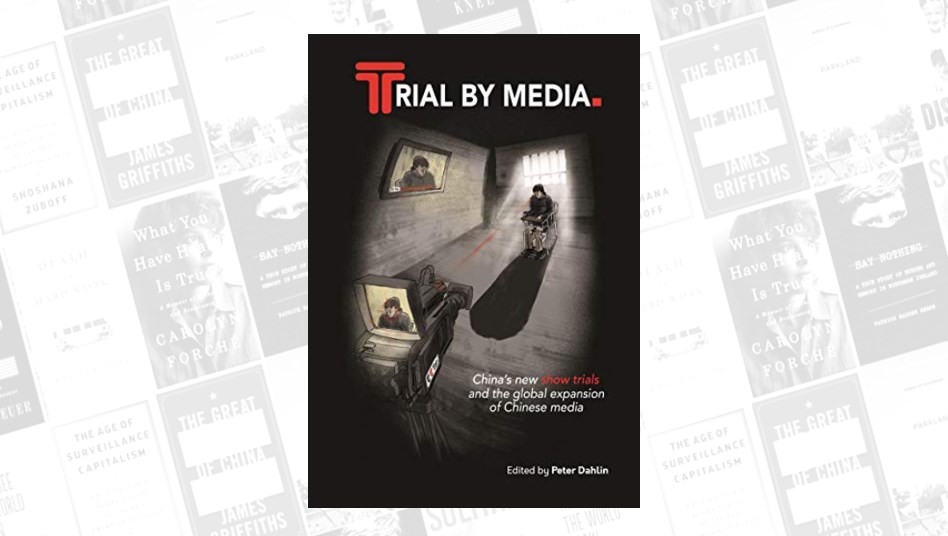
This is about a rash of televised forced confessions in China over the course of the last half-decade, a pattern that suggests the development is part of an overall policy.
As the sub-title suggests, these “new show trials” echo those of China and the Soviet Union in the past. The purpose is to show the power, authority and righteousness of the regime, to humiliate the detainees, to disparage their causes, and to cow the television-viewing populace.
That it doesn’t incite them to rebel at the great and obvious injustice on show is perhaps a sign of the extent to which the regime has been able to cow Chinese into credulous subservience (or indifference) since 1989.
The great strength of the book is that it largely consists of testimonies of victims of televised forced confessions. Dahlin’s campaign may have already had an effect, since it appears that the incidence of such confessions has decreased significantly.
Dahlin, himself a victim, is now campaigning to stop Chinese state media from broadcasting abroad by getting overseas authorities to deny or revoke permission, based on the fact that state media have been complicit in these human rights abuses and even aired some of the forced confessions overseas.
Blood Letters: The Untold Story of Lin Zhao, a Martyr in Mao’s China, Lian Xi (Basic Books)

The title comes from the fact that while Lin Zhao was in prison in the mid-1960s, she wrote copious letters using her own blood, the only “ink” to which she had access. Miraculously, the letters were preserved, and decades later, some were released by a judge to her surviving family.
She was executed for her counter-revolutionary recalcitrance, but as a result of her story emerging and her voice not having been entirely silenced, she has emerged as a quasi-saint to many in China who want democracy, freedom and rights; the regime regularly has to prevent people from visiting her grave.
Lin Zhao represents the fate suffered by basic human morality and truth-telling in a totalitarian dictatorship as well as the hope for what China might still become some day.
This is an excellent biography, the fullest account yet of Lin Zhao’s life. It traces her family back to Suzhou and gives a sense of the world that China was before the Communists came to power, of the many possibilities that existed then and were snuffed out by Maoist dictatorship.
Lin Zhao herself became a Communist at the age of sixteen, and ardently participated in what turned out to be a genocide of the landlord classes, the first of many genocides perpetrated by the Communists after coming to power.
In the Chinese-speaking world, Lin Zhao’s story has drawn much attention. Hu Jie’s excellent documentary, “Searching for the Soul of Lin Zhao” is also well worth seeing.
Operation Caesar: At the Heart of the Syrian Death Machine, Garance Le Caisne (Polity)
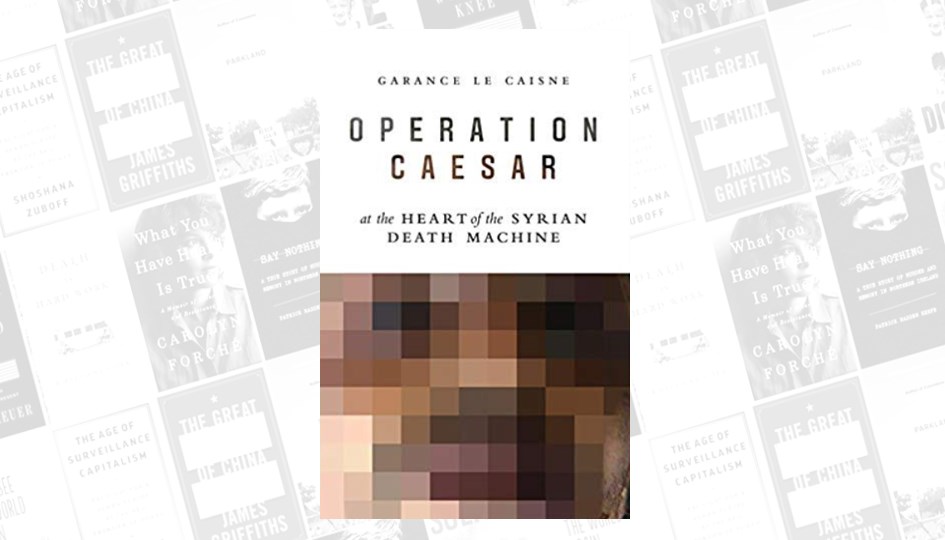
In 2013, a man who had been working for the Syrian regime as a military photographer managed to smuggle out of the country 53,000 photos showing prisoners tortured, starved and burned to death. This is the story of how he did it.
The book was originally published in French in 2015 and only made it into English in 2018. That lag time, while the Syrian civil war continued, might be just one sign of the world’s general indifference and inaction in regard to the atrocities committed in Syria.
Even after revelations such as this have come to light, no effective action has been taken by governments, which have either aided and abetted the regime (Russia, Iran, other middle Eastern countries, and, at a further distance, China) or done (close to) nothing (the US and Europe).
Civilizing Torture: An American Tradition, W. Fitzhugh Brundage (Belknap Press)

This gives an overview of a way of talking about torture that has existed as long as the United States and even before. Every time the US has engaged in torture, which has not been infrequent, attempts to bring it to light and stop it have met a similar logic: torture is bad and we are good, therefore we don’t do it.
As the title suggests, attempts have repeatedly been made to make torture more palatable to the masses and obscure it, using America’s self-image as the exceptional country. Torture has been referred to by many euphemisms, the most infamous of the Bush years being “enhanced interrogation techniques”.
The periods and phenomena focused on here include prisons, police, slavery, the Civil War, the imperial wars in the Philippines and Vietnam, the Cold War, and the War on Terror. Hopefully, torture is on its way out, but the way in which it has occurred again and again in US history should give the hopeful pause.
Other notable books
The books below could easily have ended up on the list above if I had got round to reading them. Samples and reviews assure me they’re worthy of attention.
- Justice for Some: Law and the Question of Palestine, Noura Erakat (Stanford University Press)
- Stone Men: The Palestinians Who Built Israel, Andrew Ross (Verso)
- Democracy and Dictatorship in Europe: From the Ancien Régime to the Present Day, Sheri Berman (Oxford University Press)
- The Thirty-Year Genocide: Turkey’s Destruction of its Christian Minority, Benny Morris, Dror Ze’evi (Harvard University Press)
- Challenging Beijing’s Mandate of Heaven: Taiwan’s Sunflower Movement and Hong Kong’s Umbrella Movement, Ming-sho Ho (Temple University Press)
- Charged: The New Movement to Transform American Prosecution and End Mass Incarceration, Emily Bazelon (Random House)
- Until We Reckon: Violence, Incarceration, and a Road to Repair, Danielle Sered (The New Press)
- An American Summer: Love and Death in Chicago, Alex Kotlowitz (Random House)
- As Long as Grass Grows: The Indigenous Fight for Environmental Justice, from Colonization to Standing Rock, Dina Gilio-Whitaker (Beacon Press)
- Our History is the Future: Standing Rock Versus the Dakota Access Pipeline, and the Long Tradition of Indigenous Resistance, Nick Estes (Verso)
- The Democracy Fix: How to Win the Fight for Fair Rules, Fair Courts, and Fair Elections, Caroline Fredrickson (The New Press)
- Democracy Works: Rewiring Politics to Africa’s Advantage, Greg Mills, Jeffrey Herbst, Olusegun Obasanjo, Tendai Biti (Picador Africa)
- The House of the Pain of Others: Chronicle of a Small Genocide, Julián Herbert, translated from the Spanish by Christina MacSweeney (Graywolf Press)
- Sacred Darkness, Levan Berdzenishvili (Europa Editions)
- The Freedom Artist, Ben Okri (Head of Zeus)
- 77, Guillermo Saccomanno, translated from the Spanish by Andrea Labinger (Open Letter)
- Notes on a Shipwreck: A Story of Refugees, Borders and Hope, Davide Enia, translated from the Italian by Antony Shugaar (Other Press)
- Life and Death in Rikers Island, Homer Venters (JHUP)
- from 2018
- The Girl from Kathmandu: Twelve Dead Men and a Woman’s Quest for Justice, Cam Simpson (Harper)
- Revolution Sunday, Wendy Guerra, translated from the Spanish by Achy Obejas (Melville House)
Kong Tsung-gan‘s new collection of essays – narrative, journalistic, documentary, analytical, polemical, and philosophical – trace the fast-paced, often bewildering developments in Hong Kong since the 2014 Umbrella Movement. As Long As There Is Resistance, There Is Hope is available exclusively through HKFP with a min. HK$200 donation. Thanks to the kindness of the author, 100 per cent of your payment will go to HKFP’s critical 2019 #PressForFreedom Funding Drive.

